- Clone
- SMI 71 (See other available formats)
- Regulatory Status
- RUO
- Other Names
- Endothelial barrier antigen, EBA
- Isotype
- Mouse IgM, κ
- Ave. Rating
- Submit a Review
- Product Citations
- publications
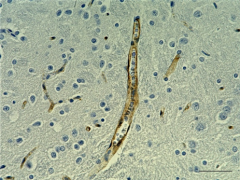
-

IHC staining of Biotin anti-Rat Blood-Brain Barrier antibody (clone SMI 71) on formalin-fixed paraffin-embedded rat brain tissue. The tissue was incubated with 1 µg/ml of the primary antibody overnight at 4°C. For detection, the HRP labeling reagent and DAB from BioLegend Ultra Streptavidin (USA) HRP Detection Kit was used (Multi-Species, component No. 5, DAB; Cat. No. 929901). The tissue was counterstained with hematoxylin and bluing solution. The image was captured with a 40X objective. Scale bar: 50 µm -

IHC staining of Biotin anti-Rat Blood-Brain Barrier antibody (clone SMI 71) on formalin-fixed paraffin-embedded rat brain tissue. The tissue was incubated with 5 µg/ml of the primary antibody overnight at 4°C. For detection, the HRP labeling reagent and DAB from BioLegend Ultra Streptavidin (USA) HRP Detection Kit was used (Multi-Species, component No. 5, DAB; Cat. No. 929901). The tissue was counterstained with hematoxylin and bluing solution. The image was captured with a 40X objective. Scale bar: 50 µm
| Cat # | Size | Price | Quantity Check Availability | Save | ||
|---|---|---|---|---|---|---|
| 836805 | 25 µg | 109€ | ||||
| 836806 | 100 µg | 240€ | ||||
SMI 71 is specific for a rat endothelial protein found in areas with blood-brain or blood-nerve barriers. The antibody does not react with endothelia of periventricular organs or with fenestrated endothelia in peripheral tissues. Specifically, it has been shown that staining with SMI 71 is not observed in blood vessels and sinusoids in the liver, vessels in the heart, adrenal, skeletal muscle, intestine, thymus, lymph nodes, pancreas, thyroid, or skin. However, a patchy reaction was observed on some vessel walls of the spleen and epidermis of the skin3. Reactivity with the antibody develops in newborn rats along with maturation of the blood brain barrier. Reactivity disappears in lesions of experimental allergic encephalomyelitis. Contrary to the belief that astrocytes and perhaps neurons are essential for the establishment of the blood-brain barrier, destruction of neurons (monitored by SMI 311 and anti-MAP2) and of astrocytes (monitored by anti-GFAP and anti-S100B) leads only to transient abolition of SMI 71 reactivity and only transient transendothelial passage of serum albumin.
Product DetailsProduct Details
- Verified Reactivity
- Rat
- Antibody Type
- Monoclonal
- Host Species
- Mouse
- Formulation
- Phosphate-buffered solution, pH 7.2, containing 0.09% sodium azide.
- Preparation
- The antibody was purified by affinity chromatography and conjugated with biotin under optimal conditions.
- Concentration
- 0.5 mg/ml
- Storage & Handling
- The antibody solution should be stored undiluted between 2°C and 8°C. Do not freeze.
- Application
-
IHC-P - Quality tested
- Recommended Usage
-
Each lot of this antibody is quality control tested by formalin-fixed paraffin-embedded immunohistochemical staining. For immunohistochemistry, a concentration range of 2.5 - 5.0 µg/ml is suggested. It is recommended that the reagent be titrated for optimal performance for each application.
- Application References
- RRID
-
AB_2728550 (BioLegend Cat. No. 836805)
AB_2728550 (BioLegend Cat. No. 836806)
Antigen Details
- Biology Area
- Cell Biology, Neuroscience, Neuroscience Cell Markers
- Gene ID
- NA
- UniProt
- View information about Blood-Brain Barrier on UniProt.org
Related Pages & Pathways
Pages
Related FAQs
- How many biotin molecules are per antibody structure?
- We don't routinely measure the number of biotins with our antibody products but the number of biotin molecules range from 3-6 molecules per antibody.
Other Formats
View All Blood-Brain Barrier Reagents Request Custom Conjugation| Description | Clone | Applications |
|---|---|---|
| Purified anti-Rat Blood-Brain Barrier | SMI 71 | IHC-P |
| Biotin anti-Rat Blood-Brain Barrier | SMI 71 | IHC-P |
| Alexa Fluor® 594 anti-Rat Blood-Brain Barrier | SMI 71 | IHC-P |
| Alexa Fluor® 647 anti-Rat Blood-Brain Barrier | SMI 71 | IHC-P |
| HRP anti-Rat Blood-Brain Barrier | SMI 71 | IHC-P |
Compare Data Across All Formats
This data display is provided for general comparisons between formats.
Your actual data may vary due to variations in samples, target cells, instruments and their settings, staining conditions, and other factors.
If you need assistance with selecting the best format contact our expert technical support team.
-
Purified anti-Rat Blood-Brain Barrier
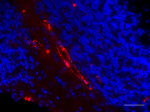
IHC staining of purified anti-Rat Blood-Brain Barrier antibo... -
Biotin anti-Rat Blood-Brain Barrier
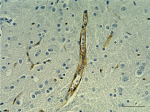
IHC staining of Biotin anti-Rat Blood-Brain Barrier antibody... 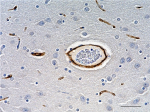
IHC staining of Biotin anti-Rat Blood-Brain Barrier antibody... -
Alexa Fluor® 594 anti-Rat Blood-Brain Barrier
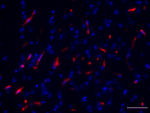
IHC staining of Alexa Fluor® 594 anti-Rat Blood-Brain Barrie... 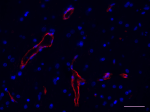
IHC staining of Alexa Fluor® 594 anti-Rat Blood-Brain Barrie... 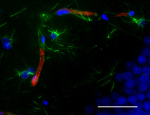
IHC staining of Alexa Fluor® 594 anti-Rat Blood-Brain Barrie... -
Alexa Fluor® 647 anti-Rat Blood-Brain Barrier
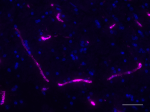
IHC staining of Alexa Fluor® 647 anti-Rat Blood-Brain Barrie... 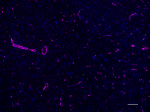
IHC staining of Alexa Fluor® 647 anti-Rat Blood-Brain Barrie... -
HRP anti-Rat Blood-Brain Barrier
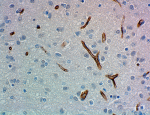
IHC staining of HRP anti-Rat Blood-Brain Barrier antibody (c...
 Login / Register
Login / Register 









Follow Us